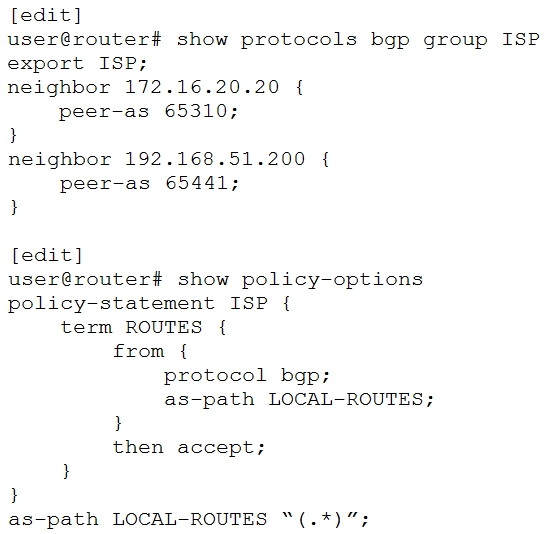
Your network is connected to two different ISPs and you notice that they are using your network for transit traffic.
In this scenario, which two configuration statements will solve this problem? (Choose two.)

Your network is connected to two different ISPs and you notice that they are using your network for transit traffic.
In this scenario, which two configuration statements will solve this problem? (Choose two.)
The appropriate configuration statements to prevent the network from being used for transit traffic by the ISPs are: 'set policy-options policy-statement ISP term REST then reject' and 'set policy-options as-path LOCAL-ROUTES (65310|65441)+'. The first statement ensures that any routes not explicitly accepted by the existing term are rejected. The second statement creates an appropriate AS path regular expression to match routes originating from AS 65310 or 65441, effectively targeting only those routes specified, and not accepting transit traffic.
A; default is accept, so leftovers should be rejected. C; You can use AS path regular expressions to create a null AS path that matches routes (prefixes) that have originated in your AS. These routes have not been advertised to your AS by any external peers. To create a null AS path, use the parentheses operator enclosed in quotation marks with no intervening spaces: “()" https://www.juniper.net/documentation/us/en/software/junos/routing-policy/topics/concept/policy-configuring-as-path-regular-expressions-to-use-as-routing-policy-match-conditions.html#understanding-as-path-regular-expressions-for-use-as-routing-policy-match-conditions__id-10256235
C is correct, we need to mark our internal BGP routes - this means AS_PATH "()" B is correct answers - we need to forbid our routes to be used by our EBGP peers, so we shouldn't export all our local routes, we should export all other BGP routes from other BGP peers which is default BGP behavior
B is incorrect, we have to export our routes.
A and C are correct
A. set policy-options policy-statement ISP term ROUTES then reject B. set policy-options as-path LOCAL-ROUTES ")" C. set policy-options policy-statement ISP term REST then reject D. set policy-options as-path LOCAL-ROUTES "(65310 I 65441) +" It's D* {m,n}Match at least m and at most n repetitions of term {m}Match exactly m repetitions of term {m,}Match m or more repetitions of term *Match 0 or more repetitions of term, same as {0,} +Match 1 or more repetitions of term, same as {1,} ?Match 0 or 1 repetitions of term, same as {0,1} |Match one of the two terms on either side of the pipe - Used to represent a range '...).()Used to group terms, or indicate null with no space
(...).()Used to group terms, or indicate null with no space
A and C are correct. *A - It's necessary to create the term REST to reject the ISPs routes *C - You can use AS path regular expressions to create a null AS path that matches routes (prefixes) that have originated in your AS. These routes have not been advertised to your AS by any external peers. To create a null AS path, use the parentheses operator enclosed in quotation marks with no intervening spaces: [edit policy-options] as-path null-as “()"; https://www.juniper.net/documentation/us/en/software/junos/routing-policy/topics/concept/policy-configuring-as-path-regular-expressions-to-use-as-routing-policy-match-conditions.html
A and C are correct. *A - It's necessary to create the term REST to reject the ISPs routes *C - You can use AS path regular expressions to create a null AS path that matches routes (prefixes) that have originated in your AS. These routes have not been advertised to your AS by any external peers. To create a null AS path, use the parentheses operator enclosed in quotation marks with no intervening spaces: [edit policy-options] as-path null-as “()"; https://www.juniper.net/documentation/us/en/software/junos/routing-policy/topics/concept/policy-configuring-as-path-regular-expressions-to-use-as-routing-policy-match-conditions.html